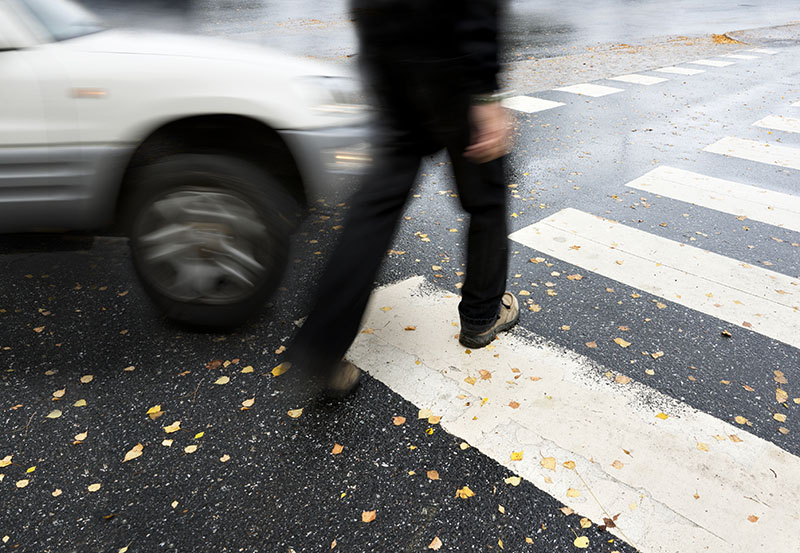
Experienced Pedestrian Accident Attorney
What Is A Personal Injury Lawsuit?
In broad terms, an injured person can file a claim against the party who allegedly caused the injury through negligence. The lawsuit allows you to have personal injury attorneys seek compensation, such as lost wages, medical bills/medical costs from medical treatment, and other pain and suffering costs.
If you believe your serious pedestrian accident lawsuit case is worth more than the insurance company offers, and the company’s representative indicates it’s unlikely the offer will increase during injury settlement negotiations, then you must take advantage of Hoybjerg Law’s free initial consultation.
California’s personal injury statute of limitations is two years, meaning if you or your loved one continues to suffer from injuries sustained during a car accident, you can file a lawsuit.
Do not cash a check or sign paperwork related to the serious injuries sustained in your car crash without legal guidance. Doing so may limit your ability to seek legal recourse.
Our personal injury lawyer, Paul Hoybjerg, can help you determine your lawsuit’s scope and options when you meet with him.
Hoybjerg’s Law Firm Process
Paul Hoybjerg is an experienced pedestrian accident attorney representing pedestrian accident victims’ claims with common injuries, severe injuries, or wrongful death.
While each pedestrian accident lawsuit is different, our pedestrian accident lawyers do follow a proven legal process to achieve results.
Free Initial Consultation
The aftermath of a car crash can be disorienting, with insurance companies rushing you to settle, especially if you or a loved one suffered a severe injury. Our free consultation will allow you to get to know our law firm, and we’ll listen to your concerns and answer your questions. Our philosophy is that if we don’t win, you don’t pay, and that’s reflected in our free consultation.

Investigate The Accident
We obtain the police report about your accident, examine photos and videos from the crash scene where the accident happened, and speak to relevant witnesses. When we have established liability, we begin to build your personal injury claim.

Build Your Claim
We want you to receive the care you need to live your life as close to how you did before being hit by a car or accident. When there is nothing more doctors can do, we help you gather your medical records, medical bills, and other medical expenses incurred. It’s important to seek us out as early as possible so that you receive treatment and build your claim before the two-year statute of limitations to file a personal injury lawsuit.

Negotiate A Settlement
We will send out a demand package – a collection of all the medical bills and documents that illustrate your injuries, wage loss, etc., since the car accident – to the at-fault party’s insurance company. Paul Hoybjerg and his team will negotiate in your best interest to ensure you receive a fair offer.

Litigate Your Case
While we hope to settle, there are times when your auto accident claim must go to court. Our team will aggressively represent you and pursue an outcome in your best interest.

Testimonials
Types of Pedestrian Accidents
Unfortunately, pedestrian accidents are a common occurrence, and several factors can contribute to a pedestrian. One of the most common causes of pedestrian accidents is driver negligence. Drivers who are distracted, impaired, speeding, or failing to yield to pedestrians in crosswalks or other designated areas can put pedestrians at risk.
Pedestrian negligence is also a factor in many accidents. Individuals who are jaywalking, walking while distracted, or not paying attention to traffic signals and crossing signs can be hit by a vehicle.
Both drivers and pedestrians under the influence of alcohol or drugs are more likely to be involved in pedestrian accidents. To reduce the risk of pedestrian accidents, it is important for both drivers and pedestrians to be aware of their surroundings, follow traffic laws and signals, and take precautions to avoid accidents.
Yes, you may be able to recover compensation for your injuries in a pedestrian accident in California. California law allows pedestrians who are injured in accidents caused by another party’s negligence to seek compensation for their losses.
If the driver of the vehicle was at fault for the accident, you may be able to file a claim with their insurance company to recover compensation for your medical expenses, lost wages, pain and suffering, and other damages. In California, drivers are required to carry liability insurance coverage, which can provide compensation for injured pedestrians.
If the driver does not have sufficient insurance coverage or is uninsured, you may be able to recover compensation through your own insurance policy, such as through uninsured/underinsured motorist coverage.
California follows a comparative negligence system, which means that even if you were partially at fault for the accident, you may still be able to recover some compensation for your injuries. However, the amount of compensation you can recover may be reduced to reflect your level of fault.
It is important to seek the advice of an experienced personal injury attorney if you have been injured in a pedestrian accident in California. An attorney can help you understand pedestrian accident injuries, your legal rights, and options for pursuing compensation and can work to negotiate a fair settlement on your behalf or litigate your case in court if necessary.
Types of Pedestrian Accidents
Vehicle-Related Pedestrian Accidents
Crosswalk Accidents: Drivers failing to yield to pedestrians at marked crosswalks.
Turning Vehicle Collisions: Drivers turning right or left at intersections and striking pedestrians.
Backing-Up Accidents: Vehicles reversing in driveways, parking lots, or streets without noticing pedestrians.
Speeding Accidents: High-speed vehicles reducing the chance to stop in time for pedestrians.
Hit-and-Run Accidents: Drivers fleeing the scene after striking a pedestrian.
Intersection Accidents
Failure to Obey Traffic Signals: Drivers running red lights or stop signs at intersections.
Mid-Block Crossings: Pedestrians crossing the road where there are no crosswalks or signals.
Parking Lot Accidents
Low-Speed Impacts: Drivers not noticing pedestrians while navigating parking lots.
Blind Spot Accidents: Pedestrians hit by vehicles due to visibility issues in parking areas.
Distracted Driving and Pedestrian Accidents
Texting While Driving: Drivers failing to notice pedestrians due to distractions.
Impaired Driving: Alcohol or drug use reducing reaction times and awareness.
Pedestrian-Related Accidents
Jaywalking: Crossing streets outside designated crosswalks.
Walking Against Traffic: Walking in areas not meant for pedestrians, like highways.
Distracted Walking: Pedestrians using phones or headphones, leading to inattention.
Bicycle and E-Scooter Collisions
Sidewalk Collisions: Pedestrians struck by bicyclists or e-scooter riders on sidewalks.
Shared Pathway Accidents: Conflicts on shared pedestrian and cyclist paths.
Environmental or Infrastructure-Related Accidents
Poor Lighting Conditions: Pedestrians not visible to drivers at night.
Road Hazards: Potholes or uneven pavement causing trips and falls.
Construction Zone Accidents: Unsafe pathways due to road or building construction.
Bus and Public Transportation Accidents
Bus Stops: Pedestrians hit while boarding or alighting from buses.
Crossing Near Public Transport: Collisions near train tracks or bus lanes.
Common Causes of Pedestrian Accidents
Distracted Driving: Drivers using phones, eating, or engaging in other distractions.
Speeding: Reduced reaction time and increased severity of impact.
Failure to Yield: Not yielding to pedestrians at crosswalks or intersections.
Driving Under the Influence: Alcohol or drugs impairing judgment and reaction times.
Running Red Lights or Stop Signs: Ignoring traffic signals and striking pedestrians.
Turning Without Looking: Right or left turns at intersections without checking for pedestrians.
Reckless Driving: Aggressive behavior such as swerving, tailgating, or abrupt lane changes.
Jaywalking: Crossing streets outside designated crosswalks or against signals.
Distracted Walking: Using phones, wearing headphones, or not paying attention to surroundings.
Crossing Highways or Freeways: Attempting to cross where pedestrian access is prohibited.
Walking Under the Influence: Alcohol or drugs impairing a pedestrian’s judgment or balance.
Poor Lighting Conditions: Low visibility at night or in poorly lit areas.
Unsafe Road Design: Lack of crosswalks, sidewalks, or pedestrian signals.
Bad Weather: Rain, fog, or snow reducing visibility and traction for both pedestrians and drivers.
Road Hazards: Potholes, uneven pavement, or construction debris causing falls.
Construction Zones: Confusing or unsafe detours for pedestrians.
Lack of Sidewalks: Forcing pedestrians to walk on roads.
Malfunctioning Traffic Signals: Broken or poorly timed pedestrian crossings.
Heavy Traffic Areas: More vehicles increasing the likelihood of collisions.
Bus or Train Stops: Pedestrians crossing near public transport routes without adequate safety measures.
Driver Blind Spots: Especially in large vehicles like trucks or buses.
Common Pedestrian Accident Injuries
Traumatic Brain Injuries (TBIs): Including concussions, skull fractures, or severe brain damage.
Scalp Lacerations: Cuts or abrasions to the scalp, often requiring stitches.
Facial Injuries: Broken noses, cheekbones, or jawbones, as well as dental trauma.
Spinal Cord Damage: Leading to partial or complete paralysis (paraplegia or quadriplegia).
Herniated Discs: Resulting in chronic pain or limited mobility.
Back Strains and Sprains: From impact forces.
Leg and Arm Fractures: Commonly in the tibia, fibula, radius, or ulna.
Hip Fractures: Especially severe in older pedestrians.
Pelvic Fractures: Often requiring extensive surgery and rehabilitation.
Rib Fractures: Leading to potential complications like punctured lungs.
Ligament Tears: Such as ACL or MCL injuries in the knees.
Sprains and Strains: Common in ankles, wrists, and other joints.
Whiplash: Damage to neck muscles and ligaments from sudden impacts.
Organ Damage: Injuries to the liver, spleen, or kidneys from blunt force trauma.
Internal Bleeding: Life-threatening injuries requiring immediate medical attention.
Punctured Lungs: Often caused by broken ribs or penetrating injuries.
Road Rash: Abrasions caused by sliding on pavement.
Lacerations and Cuts: Ranging from minor to severe, potentially causing significant scarring.
Burns: From contact with hot vehicle surfaces or fires.
Post-Traumatic Stress Disorder (PTSD): Emotional trauma following a severe accident.
Depression or Anxiety: Particularly if injuries result in long-term disability or lifestyle changes.

